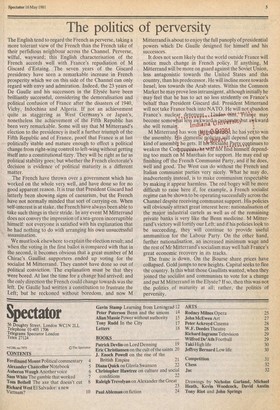The politics of perversity
The English tend to regard the French as perverse, taking a more tolerant view of the French than the French take of their perfidious neighbour across the Channel. Perverse, wilful, wayward; this English characterisation of the French accords well with France's repudiation of M Giscard d'Estaing. The seven years of the Giscard presidency have seen a remarkable increase in French prosperity which we on this side of the Channel can only regard with envy and admiration. Indeed, the 23 years of De Gaulle and his successors in the Elysee have been brilliantly successful, considering the demoralisation and political confusion of France after the disasters of 1940, Vichy, Indochina and Algeria. If not an achievement quite as staggering as West Germany's or Japan's, nonetheless the achievement of the Fifth Republic has been very remarkable. Some will say that M Mitterrand's election to the presidency is itself a further triumph of the Fifth Republic and of France, proof that France is at last politically stable and mature enough to effect a political change from right-wing control to left-wing without getting itself into a constitutional tizzy. They will be right as far as political stability goes; but whether the French electorate's decision is evidence of political maturity is a different matter.
The French have thrown over a government which has worked on the whole very well, and have done so for no good apparent reason. It is true that President Giscard had latterly been showing signs of caesarism, but the French have not normally minded that sort of carrying-on. When self-interest is at stake, the French have always been able to take such things in their stride. In any event M Mitterrand does not convey the impression of a sea-green incorruptible himself: not everyone is satisfied with his explanation that he had nothing to do with arranging his own unsuccessful assassination.
We must look elsewhere to explain the election result; and when the voting in the first ballot is compared with that in the second, it becomes obvious that a great number of M Chirac's Gaullist supporters ended up voting for the socialist M Mitterrand. They cannot have done so out of political conviction. The explanation must be that they were bored. At last the time for a change had arrived; and the only direction the French could change towards was the left. De Gaulle had written a constitution to frustrate the Left; but he reckoned without boredom, and now M Mitterrand is about to enjoy the full panoply of presidential powers which De Gaulle designed for himself and his successors.
It does not seem likely that the world outside France will notice much change in French policy. If anything, M Mitterrand will be more on guard against the Soviet Union, less antagonistic towards the United States and this country, than his predecessor. He will incline more towards Israel, less towards the Arab states. Within the Common Market he may prove less intransigent, although initially he may feel that he has to act no less stridently on France's behalf than President Giscard did. President Mitterrand will not take France back into NATO. He will not' abandon France's nucle,ar ,Lladem 'Ilr`an/e may become somewealles aNykwardoRtovyAit;)but alikward she will remain. Mu"' I" 4 M Mitterranclhas wontAltios9 he hag yetto win 48)1; the assembly. I,Jis domestic ol ill depend upon the kind of assemble he gets. If hkSiocialik Arty.mtinues to weaken the CortiminoisAs lte ivtif ii;id himself depending too much on M Marchais for support. He may end up finishing off the French Communist Party, and if he does, well and good. The West can do without the French and Italian communist parties very nicely. What he may do, inadvertently instead, is to make communism respectable by making it appear harmless. The red bogey will be more difficult to raise here if, for example, a French socialist regime can be shown to be operating successfully across the Channel despite receiving communist support. His policies will obviously attract great interest here: nationalisation of the major industrial cartels as well as of the remaining private banks is very like the Benn medicine. M Mitterrand's victory will fortify our Left; and if his policies look to be succeeding, they will continue to provide useful ammunition for the Labour Party. On the other hand, further nationalisation, an increased minimum wage and the rest of Mr Mitterrand's socialism may well halt France's great economic recovery in its tracks.
The franc is down. On the Bourse share prices have collapsed. Gold jumps to new heights. Capital seeks to flee the country. Is this what those Gaullists wanted, when they joined the socialist and communists to vote for a change and put M Mitterrand in the Elysee? If so, then this was not the politics of maturity at all; rather, the politics of perversity.










































 Previous page
Previous page